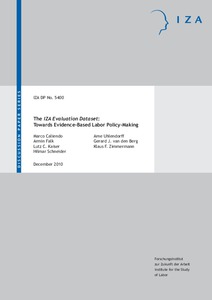The IZA evaluation dataset: towards evidence-based labor policy-making
"Short-time work compensation aims at reducing lay-offs by allowing employers to temporarily reduce hours worked while compensating workers for the induced loss of income. These programs are now widespread in the OECD countries, notably following the 2008-2009 crisis. This paper discusses the e...
| Main Authors: | , , , , , , |
|---|---|
| Institution: | ETUI-European Trade Union Institute |
| Format: | TEXT |
| Language: | English |
| Published: |
Bonn
2010
IZA |
| Subjects: | |
| Online Access: | https://www.labourline.org/KENTIKA-19183090124919012729-The-iZa-evaluation-dataset-tow.htm |
| Summary: | "Short-time work compensation aims at reducing lay-offs by allowing employers to temporarily reduce hours worked while compensating workers for the induced loss of income. These programs are now widespread in the OECD countries, notably following the 2008-2009 crisis. This paper discusses the efficiency of this type of policy and investigates its impact on unemployment and employment. There is some evidence that short-time compensation programs stabilize permanent employment and reduce unemployment during downturns. All in all, it seems that short-time work programs used in the recent downturn had significant beneficial effects. This suggests that countries which do not have short-time compensation programs could benefit from their introduction. But short-time compensation programs can also induce inefficient reductions in working hours and reduce the prospects of outsiders if used too intensively. Thus, the design of short-time compensation programs should include an experience-rating component. " |
|---|---|
| Physical Description: | 30 p. Digital |

